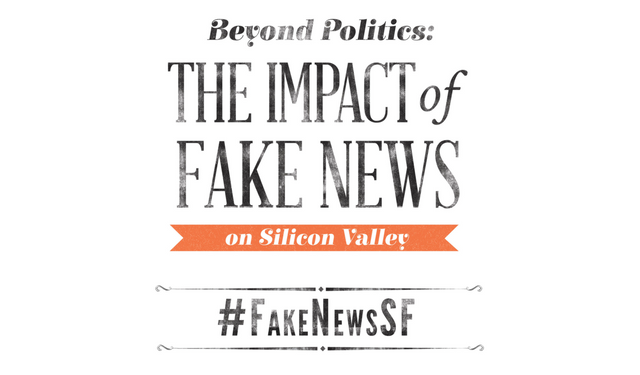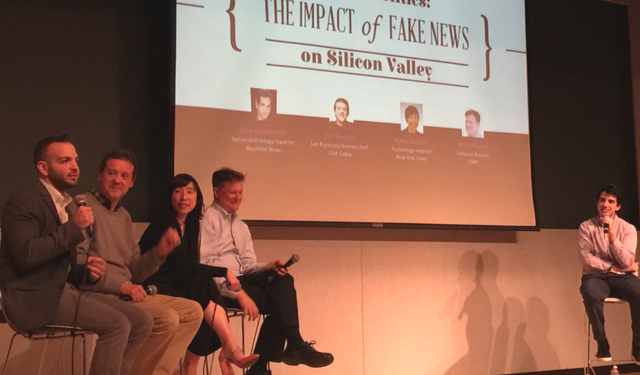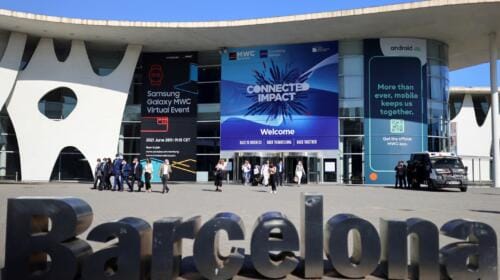 To kick off the conversation, the panelists addressed the definition of “fake news,” which has become increasingly blurry since the election – and for the most part, the panelists were in agreement. Fake news isn’t just “bad journalism,” according to Rosoff, it’s stories that are “intentionally written to be false” to sway opinion. This may seem obvious to communications professionals, but over the last five months the use of “fake news” as a descriptor has extended well beyond teens in the Balkans falsely reporting on Bernie Sanders’ plans to vote for Trump, and has been applied to reputable outlets such as CNN and The New York Times. Benner agreed, saying that we are increasingly seeing opinion pieces categorized as fake news incorrectly.
To kick off the conversation, the panelists addressed the definition of “fake news,” which has become increasingly blurry since the election – and for the most part, the panelists were in agreement. Fake news isn’t just “bad journalism,” according to Rosoff, it’s stories that are “intentionally written to be false” to sway opinion. This may seem obvious to communications professionals, but over the last five months the use of “fake news” as a descriptor has extended well beyond teens in the Balkans falsely reporting on Bernie Sanders’ plans to vote for Trump, and has been applied to reputable outlets such as CNN and The New York Times. Benner agreed, saying that we are increasingly seeing opinion pieces categorized as fake news incorrectly.
During the discussion, Swartz went as far as characterizing the recent Rachel Maddow release of Trump’s tax returns as a “fake news moment,” referring to the fact many believe the president intentionally released the document to create a story that cast him in a favorable light. He further clarified his point, saying that it was real news, but “it felt misleading.” According to Swartz, that seems to be alright with some Americans, who are now often seeking out news that aligns with their political persuasion. Because of this, an echo chamber of misinformation is created that entrenches individuals further in their beliefs.
And, fake news isn’t new. Benner brought Rush Limbaugh up as an example of a pundit who for years has used his show to generally mislead the public. But, Facebook has completely changed the game, according to Benner, by dramatically amplifying the reach of unsubstantiated and manipulative articles. Rosoff agreed with this point, saying that Facebook has replaced casual bar talk, and that the social networking site was never meant to be a media platform. That wasn’t the last time Facebook was mentioned during the panel, and talk of Mark Zuckerberg and his company dominated conversations about both the factors fueling fake news, as well someone who stands a chance of defeating it. Benner told audience members that she believes Facebook is moving in the direction of not claiming neutrality, citing the hire of former CNN host Campell Brown. While Dotan called this simply “window dressing,” Benner insisted that how Facebook deals with the rise of fake news will be “fascinating” to watch.
That wasn’t the last time Facebook was mentioned during the panel, and talk of Mark Zuckerberg and his company dominated conversations about both the factors fueling fake news, as well someone who stands a chance of defeating it. Benner told audience members that she believes Facebook is moving in the direction of not claiming neutrality, citing the hire of former CNN host Campell Brown. While Dotan called this simply “window dressing,” Benner insisted that how Facebook deals with the rise of fake news will be “fascinating” to watch.
But, Facebook wasn’t the only social network to come up during the panel. Twitter was another focal point of the conversation. According to Swartz, if Franklin Roosevelt was the radio president and John F. Kennedy was the television president, then Trump is the social media president – saying that he doesn’t expect him to give up on Twitter anytime soon. Benner agreed, adding that Trump’s deft use of Twitter absolutely helped him get elected.
However, when the conversation shifted back to what can be done about fake news, the panelists nearly unanimously agreed that Zuckerberg, as CEO of the world’s largest social network and popular platform used for spreading fake news, bears much of the responsibility. And, some of the reporters expressed optimism, with Kantrowitz saying that it is within Facebook’s business interests to reduce the spread of fake news. He went on to say that Facebook is currently “more aware” of the issue than other platforms, but that Zuckerberg still has to “step up” because of the immense power wielded by the social networking titan.



